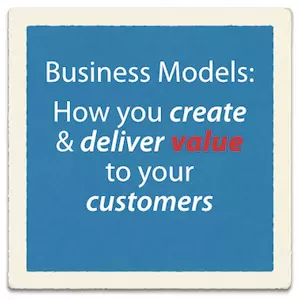 What is the Business Model Manifesto?
What is the Business Model Manifesto?
Business models… what are they and why are they important? This is the fundamental question I’ve been asking myself as I prepare my presentation to National Speakers next week. The title is ‘Business Models for Speakers’. And, thus I’ve created ‘The Business Model Manifesto. It offers ten principles for understanding business models.
1 Are like belly buttons
Business models are like belly buttons because every business has one. As soon as we decide to go into business we adopt a business model. For instance, as soon as you decide to open a shop, you’ve chosen a retail business model.
2 Are as old as business
Following on from rule #1, given every business has a business model then clearly they are not new… they are as old as the business itself.
3 Have fresh importance
Business models have enjoyed a fresh resurgence in recent years. They have come to prominence due to the dot-com era where new businesses were popping up every day with different models for delivering value to customers. The underlying driver for this shift is the rise of digital technology, which has created a whole host of new business model opportunities. For instance, retail can now be a physical store, an online store or a combination of both. Today, business models are a primary way to innovate to disrupt existing industries or to avoid your own disruption.
4 Are your Second Biggest Decision
The first and biggest decision you make in business is to decide to be in business. And, as soon as you decide what type of business you are going to run then you’re choosing your business model. Therefore, your business model is the second biggest decision you’ll make. This is a useful context for understanding its importance.
5 Value is Everything
Business models are based on the value you provide for your customers. A common definition of a business model is:
How a business creates and delivers value to its customers. Therefore, two fundamental questions for any business are:
- What value do you provide?
- And, how do you deliver this?
6 Your Customer is Your Context
A third fundamental question about business models is:
Who is your customer?
This is crucial because the value you provide is perceived in different ways by different customers – and even at different times by the same customers. For instance, sometimes you might buy a take-away coffee because you want something fast; sometimes you might want a coffee to sit down and savour in a comfortable setting, and at other times you might make a coffee at home. In each of these cases, having a coffee is vital and the why, when and where you drink it changes. Ultimately, your customer is the context for deciding which business model to employ. It will determine what value is important and how best to deliver it.
7 The Best Fit Wins
And, so it follows: How do you know if you have the right business model? The right business model is the one that is the best fit between these three forces:
- What you offer
- How you deliver it and
- What your customers want
8 Are like skinning a cat
Business models are like skinning a cat. As the old saying suggests, there’s always more than one way to… And, the same applies to your business. As you can see in our previous coffee examples there are always plenty of ways to provide coffee. Which one will you choose?
9 Be like water
Business models are like water…
- If you’re a startup your business model might be fast and ever-changing form just like steam. Your goal is to give it some solid form.
- If you’re an established business you might be slow, steady and fixed like ice. Your goal is to loosen up a little to be open to new ways of doing things.
- Ideally, you will be flexible and fluid like water where you are able to move, change and tweak your business model to suit the changing needs and wants of your customers and the fresh opportunities for delivering this is in different ways.
10 Disrupt yourself!
The big conversation around business models today is disruption. At a simple level, it’s the creation of new business models that provide fresh value in novel ways. In some cases, a change in business model has upset, dismantled and completely redesign entire industries. For example, bookshops are dying as they are trumped by online stores. Likewise, by allowing customers to buy one song at a time iTunes has disrupted traditional music sales that relied on selling albums. There is so much focus on business model innovation and disruption, now you need to be disrupting yourself before someone else does. At least this way you’ll have some say about when and where it happens.
Business Model Manifesto Key Questions
- What’s your business model?
- What are the risks of maintaining this business model?
- What are the opportunities for changing it?
Previously:
- Make Money From Speaking
- The Rise of Business Models
- Business Models on Wikipedia
- The Great Business Model Mistake
- Do you have a business model blindspot?

 What is the Business Model Manifesto?
What is the Business Model Manifesto?

